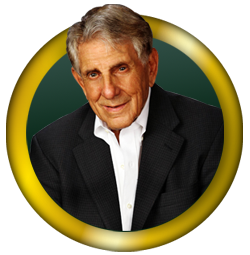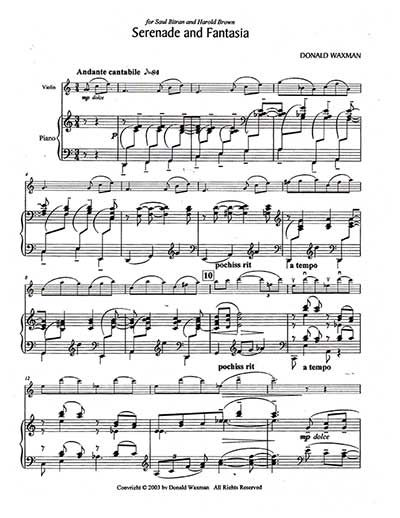play:
DONALD WAXMAN CONCERT MUSIC
Artistic Excellence in Two Genres
Tribute to Donald Waxman
Tribute to Donald Waxman
 Donald Waxman occupies a unique position among American composers. A highly fluent and versatile composer of chamber, choral and symphonic music, he is also a prodigious composer of pedagogical piano music, of which, in my estimation, he is without a peer. He has written over fifty piano educational works, all of them in print, a body of works that has won him significant praise and admiration for originality and the subtle use of a contemporary harmonic and rhythmic language. Indeed, this impressive collection of pedagogical music has been called “an American Microkosmos”. Educated at the Peabody Institute and the Juilliard School, he won early recognition for his creative talents. While still in his thirties he was awarded a Guggenheim Fellowship to Paris, and his career has since been marked by many awards and commissions and performances from choruses, chamber ensembles and orchestras throughout the country. The elements of song and dance are the core of all of his music, expressed in an engaging and fresh sounding tonal language. These lyrical qualities and the rhythmic vitality and originality that one finds in his concert music distinguishes his piano educational compositions in equal measure, whether in his simple music for beginners or in his extraordinary sets of etudes for advancing students.
Donald Waxman occupies a unique position among American composers. A highly fluent and versatile composer of chamber, choral and symphonic music, he is also a prodigious composer of pedagogical piano music, of which, in my estimation, he is without a peer. He has written over fifty piano educational works, all of them in print, a body of works that has won him significant praise and admiration for originality and the subtle use of a contemporary harmonic and rhythmic language. Indeed, this impressive collection of pedagogical music has been called “an American Microkosmos”. Educated at the Peabody Institute and the Juilliard School, he won early recognition for his creative talents. While still in his thirties he was awarded a Guggenheim Fellowship to Paris, and his career has since been marked by many awards and commissions and performances from choruses, chamber ensembles and orchestras throughout the country. The elements of song and dance are the core of all of his music, expressed in an engaging and fresh sounding tonal language. These lyrical qualities and the rhythmic vitality and originality that one finds in his concert music distinguishes his piano educational compositions in equal measure, whether in his simple music for beginners or in his extraordinary sets of etudes for advancing students.
ROBERT SILVERMAN, former Editor of The Piano Quarterly

Serenade and Fantasia for violin and piano
Biography
Donald Waxman is a native of Baltimore, Maryland, where at an early age he began his music studies at the Peabody Conservatory's preparatory school. His principal teachers were Carlotta Heller in piano, Felix A. Mendelssohn in cello and Howard Thatcher in theory and composition. After graduating from high school he was inducted into the U.S. Army and served overseas as an infantryman and French interpreter in the Second World War. After returning to the States, he resumed his composition studies at the Peabody Conservatory, where his principle teacher was Elliott Carter. He is a graduate of both the Peabody Conservatory and the Juilliard School.
Mr. Waxman has written for almost every genre, including compositions for piano and piano ensemble (many of which were premiered by the composer and his pianist wife, Jho Waxman), chamber ensemble, voice, chorus, symphonic and chamber orchestra. Orchestral performances of his works have included the Houston Symphony, the St. Louis Symphony, the Honolulu Symphony, the Seattle Symphony, National Gallery Orchestra, the Kansas City Symphony and the Oakland Symphony, among others. Chamber music and choral premieres have included the New York Composers Forum, Bennington Composers Forum, Huntingdon Trio, Baltimore Chamber Music Society, Florida Philharmonic Chamber Players and the Gregg Smith Singers, among others. Three of the largest MTNA (Music Teachers National Association) state organizations have honored Mr. Waxman in naming him their “Composer of the Year” and commissioning works that were premiered at their state conferences: Trio for Flutes and Piano at the 1985 New York state conference, Arabesques and Ostinato at the 1993 California state conference and Variations on a Waltz of Diabelli for violin, clarinet, cello and piano at the 1997 Florida state conference.
While still a student at the Peabody Conservatory he began receiving awards for his compositions, including the RCA Composition Prize and twice the Gustav Klemm Composition Prize, given to the conservatory's most outstanding composition student. In 1964 he was awarded a Guggenheim Fellowship to Paris. In 1989 he was awarded a gold medal as the first American composer-in-residence at the Kang Nung, Korea, Music Festival. In 1998 he was awarded the Delius Society's Grand Prize for his Divertimento for wind and string quintet. In 2013 he was the composer-in-residence at the Lynn University Conservatory's New Music Festival, where his Announcement for Orchestra was premiered.
play: